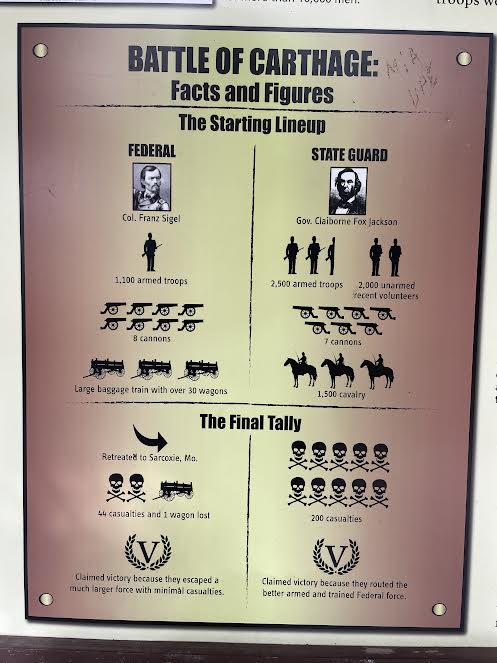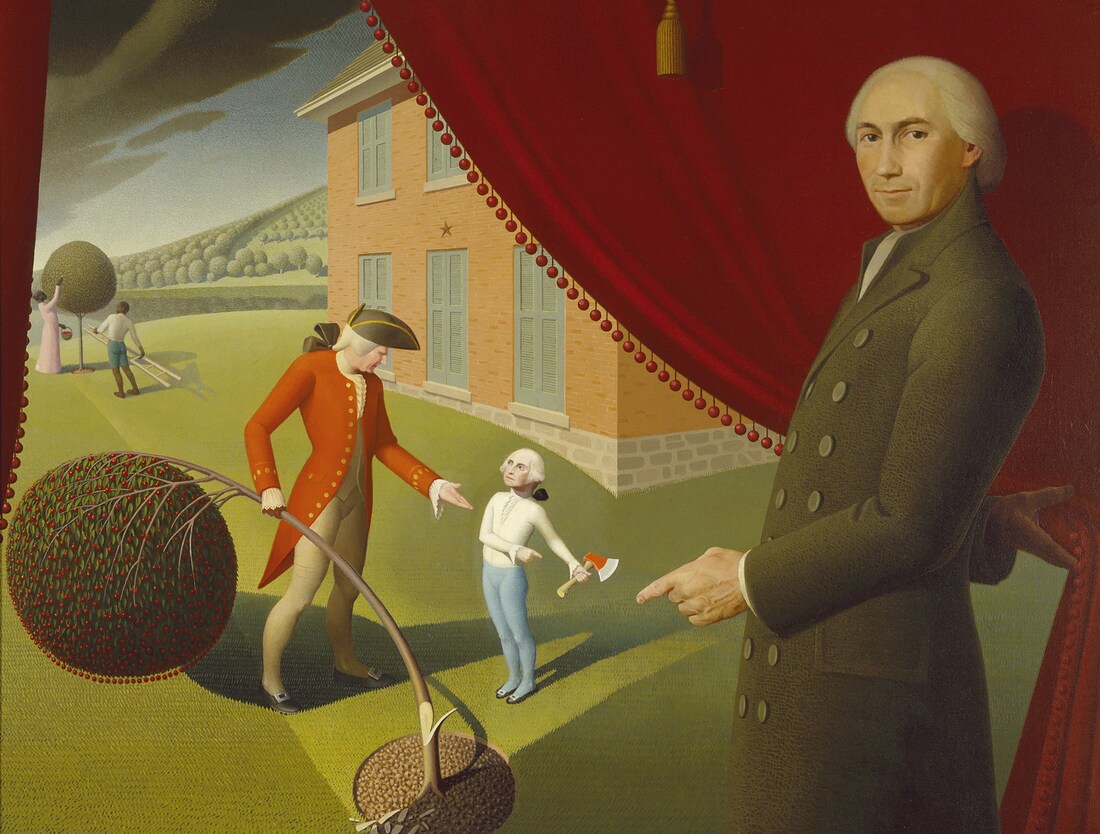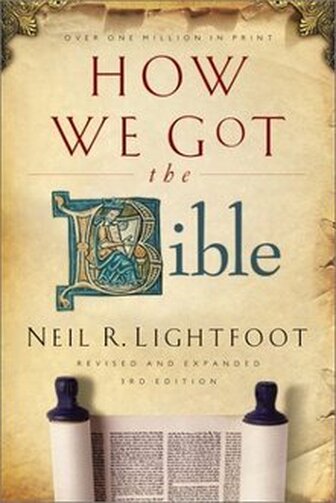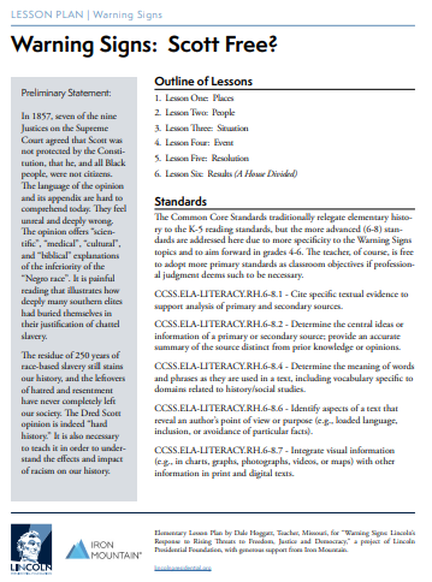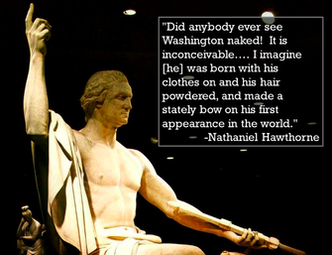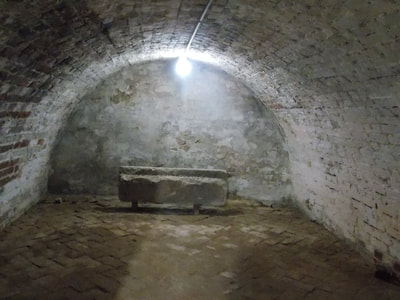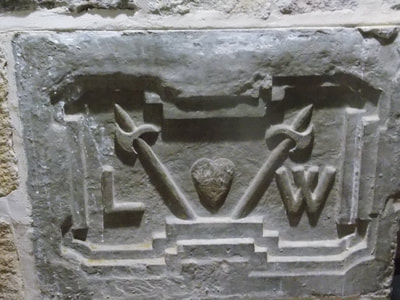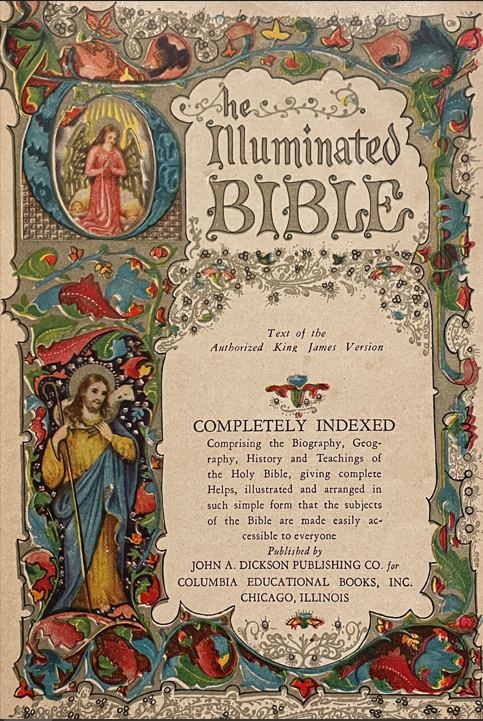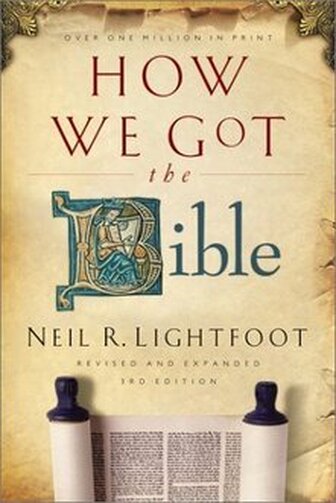|
In nearby Carthage, Missouri, there is a small plot of land that represents the Civil War battle that took place in this area. Visitors can picnic on the grounds, which today are about as peaceful (sans the vehicle noise from nearby streets) as they can be following the horrendous sounds that must have emanated from the property in the 1800s. Lives were lost and many others affected by the battles that happened in Southwest Missouri. As a border state, and as an area that is close to the southern border of the sate, the war was hot here. While people would rather glamorize the battles at places like Gettysburg, let that not mean that the lives lost on this land are any the less valuable. On a cool morning in the fall, I took the trail over the bluff and discovered the ruins of an old house that must have seen many things in its day. The sign here claims the trail should take 10 minutes to hike, but that is only because you must stop to pay homage to the folks who lived here, looking down upon the land below. The slow-moving creek provides another chance to reflect, not only upon the events of the 19th Century, but also the current events in one's life. If you visit, you won't invest much of your time here, but it will be time well spent.
0 Comments
Jane is a testimony to my continuing message that history is ugly. I suppose that ugliness is one of the reasons I'm interested in history. I suppose it helps me appreciate my own time and culture. I guess it also confirms the need for us all to learn from history. I would hate to have to repeat some of the things I've learned.
So I stared into the eyes of a rebuilt face, and I studied the dry skull of a real human being. I thought of the children I have taught through the years, some of who are 14 years old themselves. I remembered my own children. I wondered what it would take to justify cannibalizing such a weak creature. Why was she here? How did she get here? Who was she? What was her real name? And who might she have become had she survived? The following is a lesson in a historical and faithful study beginning at 7:00 pm on Wednesdays. at the church of Christ in Carthage, Missouri, south of the Ford dealership PLEASE JOIN US!
The Big Questions Our focus for this study hinges on answering these two big questions. The goal is to get closer to the answers each week in our class. How did we we get the Bible? Is the Bible accurate and dependable? The ApocryphaIn Chapter 15 of our focus text, How We Got the Bible, the author, Neil Lightfoot gives us a list of the Apocryphal books, along with a historical explanation of their history. The definition of the word apocrypha is up front in this chapter, Lightfoot using words like "hidden", "secretive", and "concealed", but he also explains that the word has evolved to refer to the non-canonical books that remain in the Catholic Old Testament, but are denied by most of the Protestant universe.
Lightfoot states: "Non-Catholic editions of the English Bible since 1535, including early editions of the familiar King James Version, separate these apocryphal books from the canonical Old Testament."  It seems that including them amongst the accepted canon has been more of a "latter day" decision in the Catholic Church (In the interest of full honesty, the books of Esdras and the Prayer of Manasseh are still not considered canonical by the Roman Catholic Church). Consider the four divisions under which the books under consideration are placed based upon their literary form: Historical, Legendary, Prophetic, and Ethical/Devotional. Our author describes each, beginning on page 166, before explaining the reasons they are rejected, starting on page 167. Many have questioned why the books are not included in the canon of Scripture, asking the question, Who gets to decide whether a book is inspired or not? Lightfoot suggests the following answers to alleviate our concerns. If we wonder if we are missing out on a part of the Word of God, we do well to read what Lightfoot penned. He says: "These books were never included in the Hebrew canon of the Old Testament..." How About the New TEstament?Hey, Jude... Even so, sometimes Bible writers do refer to literature that is outside of what we have in the 66 books of Scripture. Jude 9:14f, for example, seem to refer to an apocalyptic book known as 1 Enoch. Likewise, Paul also refers to extra-Biblical material (2 Timothy 3:8). He calls a Greek poet a "prophet" (Titus 1:12). How are these references explained? New Testament Apocrypha In addition to the Old Testament, there are also books in question for the New Testament. These also fit into categories: Gospels, Acts, Epistles, and Apocalypses. The earliest of these are dated into the Second Century, but some also come later. An incomplete list of these books includes the following titles:
Application Question How important is it? Is it important to you that the Bible comes from reliable sources, or is it just a collection of wise sayings and advice for living? Many atheists agree that there is wisdom in the teachings of Jesus Christ, but they do not believe that Jesus is a Messiah, that He performed miracles, that He walked out of His own grave, or that He prepares a place where His faithful disciples will be rewarded for eternity. We contend that the Bible and everything it contains is supported by:
So how important is it to you that the Bible can be proven true? Do you believe there is irrefutable evidence to its validity? Is proof something that strengthens your personal faith in the existence of God? Should faith alone be enough to drive you to drive you to your knees? Is "blind" faith a stronger kind of faith? If so, then why did God provide so much evidence? Go forward with us - or in this case, back to the beginning - as we continue our study next time.
Standing in the original brick church tower (and the adjoining rebuilt sanctuary) of a place named after King James was a special moment for me as I realized the importance that this King James placed on having an English translation of the Bible. Later in the day, I would also stand in a reconstructed version of the original church structure that was located nearby. The colony, the fort, and even the river bear his name, as does the 1611 English version of the Bible.
Jamestowne was settled in 1607. The original church building, made of wood, was built shortly after arrival. Other land (Grebe Land) was set aside for the use of the minister nearby in establishing a mission to teach the Natives. The brick replacement sanctuary was constructed shortly after, and I can't imagine that it would taken very long for King James Version Bibles to arrive on the American shore. Jamestowne would be one of the first American locations to receive and utilize this important publication, and it would have been right here, in the presence of these simple bricks (and that forged nail) that soul-saving Words would be read aloud. Being me, I did not resist touching the walls and the nail and allowing myself to travel some 400 years back in time to also touch the cracked, calloused hands that placed them there.
Still, the lessons look great, and I am proud to have my name appear next to the Abraham Lincoln logo (See the first page in the image at right, along with a link to the complete lesson file. Of course, you might also appreciate the four documentary-style videos that the lessons support. While the lessons I wrote focus on Missouri's own Dred and Harriet Scott and their case for freedom that spawned sharp responses from Presidential Candidate Abraham Lincoln, the videos will outline several more warning signs that predicted the inevitable American Civil War. I am including the trailer for the videos below. The videos themselves range from six to ten minutes each and may be found at the Warning Signs link or on Youtube. My roommate for the Colonial Williamsburg Teacher Institute in July was SAM. SAM is a young family man who manages the school library in his Kentucky school. He was fun to talk to and a terrific roommate in the Woodlands Hotel, just up the hill from the Visitors Center at Colonial Williamsburg. On our second night, things were peaceful, and not a sound could be heard in our hotel room. Drapes were drawn. The TV and lamps were off. We were sleeping. And suddenly, at 3:00 in the morning, this announcement could be heard on a loop. Attention! Attention! An emergency has been reported in this building. Please cease operations and leave the building utilizing the nearest exit or fire exit stairway. Do not use elevators. Repeat: do not use elevators. 'Twas kind of a rude awakening, but SAM and I did what every good teacher does: we practiced what we preached. Even if the probability showed an true emergency was unlikely, we followed the rules and evacuated our room to stand in the parking lot for an hour, waiting for the fire and police departments to give us the all clear.  I thought it was exhilarating. Don't get me wrong: I'm not a fan of real emergencies and dangers, but I realize the uncertainties of life do not always spell tragedy. Sometimes the stories that come out of an experience are worth a little inconvenience. One of the things I repeat (on a loop) is, "Life is an adventure." I know, it's not the most poetic sentence ever penned, but that sentence helps me get through difficult events. There are so many things that can distract us from the more important things, events, and people in our lives. I know there are some who have the propensity to panic when bad things happen, but whenever possible, I choose to hold that worry until I know there is something about which to be concerned. Besides, experience tells us that panicking does more harm that good. I remember, some 50 years ago, having to evacuate our school building because of a bomb threat (No, those aren't new.). The same thing happened when I was in high school (at least once). I remember practicing, every year, for fires and tornados. I recall being evacuated from the Lord Baltimore Hotel in Maryland - having to walk down several flights of stairs to exit onto the street - because of a fire alarm. These events are good practice, and we take them seriously, but they are also an indication of the low probability of being in a real situation. Thankfully, I saw no one panicking on our side of the hotel in July, and it was a great way for us to bond together at breakfast and throughout the following day. Some people were awfully tired after working so hard to fall asleep for the second time an hour later. It didn't affect our schedule, and we had one more thing in common to talk about. It also made for a nice little story of adventure upon the return home. These things happen, and these days I'm even looking for them to happen. The Baltimore trip was my first trip alone. That, along with my missed flights in returning from Mount Vernon, the thunderstorm with bateauing on Lake Champlain at Fort Ticonderoga, and the "crash" landing at the Orlando Airport this May. Perhaps the AJR lyric below is what I think about when these things happen, and now that I accept this as fact, I sickly anticipate these little adventures just so I can tell the stories. A hundred bad days made a hundred good stories
Some Questions:
Let's Think: After telling Zechariah that his wife will give birth to a son, the angel informs Zechariah that John (the son) will be special. The boy will grow into a great man who does not drink. In fact, it seems that John will trade drink (and probably other vices) for the Holy Spirit - even while still in the womb. Zechariah, the priest, must be pleased to hear that his son will be responsible for getting the Israelite people to return to God. He might also be fearful when he hears the next thing the angel speaks - that John will be a forerunner to another. The angel invokes the name of Elijah, and specifically reminds Zechariah about the prophecy that says one like Elijah will come. He must understand that the angel is talking about a Savior. What a responsibility! Still, how happy it must make Zechariah to understand that his own son will be the one to fulfill this prophecy. I wonder how shocked he is to hear that the Messiah is likely coming during his own lifetime. Maybe he anticipates the possibility of meeting the Son of God in person. I wanted to write more than a thank-you to the benefactors who made it possible for me to attend the 2022 Colonial Williamsburg Teacher Institute. I thought it was important to be more specific about what I gained from the experience. After three years of waiting through COVID delays and international fear, I finally visited Colonial Williamsburg, participating in the rich instruction of the professionals there during this summer’s teacher institute. I cannot begin to express my appreciation to you and to others who make this experience possible for teachers who do not always have the means to travel for the deep training that Colonial Williamsburg offers.  Around 1900, three million horses inhabited urban America, with the healthier ones contributing from 20 to 25 pounds of manure each day. On every street, their presence was evident as swarms of flies circulated and pungent odors permeated the air. To add to the atmosphere, almost every block boasted stables packed with urine-saturated hay. When it rained, the streets turned to a muddy manure mush. During dry spells, heavy carriage and foot traffic beat the dung to a fine dust which, as one contemporary put it, blew “from the pavement as a sharp piercing powder, to cover our clothes, ruin our furniture, and blow up into our nostrils.” New York alone was home to approximately 150,000 horses or, pessimistically, to some ten million pounds of manure a year. The offerings of the 15,000 horses of Rochester, New York, in 1900, would have covered an acre of soil with a heap 175 feet high. In light of ever-increasing production, many Americans feared that their cities would soon disappear under the dung. But a godsend from the turn-of-the-century pollution was becoming available. At last, rejoiced Americans, the curtain was closing on the age of equine air. Cities would now be cleaner, quieter, healthier, safer places in which to work and live. At last, the age of the automobile had arrived! If Only... It seems people are always waiting for the next best thing to arrive and take them away from their hectic, confusing, and busy lives. We often dream, if only I could pass that test; if only I could afford that car; if only I could keep a steady relationship with a member of the opposite sex; if only we could produce a child; if only we could find a cure to that disease. Life would be so much better if only. What people don’t realize – what people forget – is that the best new thing actually came several years ago, and its name is Jesus. Byron Nichols announced, in an article written for The Voice of Truth International, "Jesus is the most dynamic, life-changing, powerful personality to ever enter this world." When Jesus Christ stepped into the world, He shattered all the if onlys to pieces. No if only can ever aspire to top His sacrifice. He Who is perfect has arrived and done the perfect thing. He is what we have been waiting for. Jesus Christ is our Hope! In Paul’s salutation written to Timothy in 1 Timothy 1:1, he simply states, "Paul, an apostle of Christ Jesus according to the commandment of God our Savior, and of Christ Jesus, Who is our hope." Emily Dickinson, the beloved poet, said, "Hope is the thing with feathers that perches in the soul." Cesare Pavese understood that "Waiting is still an occupation." It is not having anything to wait for that is terrible. Roy Z. Kemp professed, "There is no better or more blessed bondage than to be a prisoner of hope." Even the oft-quoted philosopher, Henry David Thoreau, believed, "We must learn to reawaken and keep ourselves awake, not by mechanical aids, but by an infinite expectation of the dawn." But while these profound statements speak of hope, none are referring to the Hope that we have in Jesus Christ. Indeed, our Hope is more than a dream of Prince Charming, and it is more than a wish on a star or a penny in a wishing well. Hebrews 11:1 associates our hope with our faith. It says that "faith is the assurance of things hoped for…" Johann Wolfgang von Goethe explained it well, when he said, "Sometimes our fate resembles a fruit tree in winter. Who would think that those branches would turn green again and blossom, but we hope it, we know it." His statement describes true hope as something we expect will really come. Whether or not he was describing Christ, his statement rings true in regard to Christ. He is our Hope! He has been called glorious and exalted; He has been called perfect and flawless; it is said He is kind, caring, sinless, faultless, outreaching, soul-touching, heart-changing, great, merciful, mighty, majestic, all-knowing, and compassionate. Those are just some of the adjectives. In fact, according to John 21:25, we could not possibly list all the adjectives, because we do not know all the verbs; we don’t know everything that Jesus did. It says, "And there are also many other things which Jesus did, which if they were written in detail, I suppose that even the world itself would not contain the books which were written." We’ll leave the topic for now with 2 Corinthians 9:15, in which Paul cleanly pronounces, "Thanks be to God for His indescribable gift!"
The following is a lesson in a historical and faithful study
beginning at 7:00 pm on Wednesdays. at the church of Christ in Carthage, Missouri, south of the Ford dealership PLEASE JOIN US!
Application Question
How important is it?
Is it important to you that the Bible comes from reliable sources, or is it just a collection of wise sayings and advice for living? Many atheists agree that there is wisdom in the teachings of Jesus Christ, but they do not believe that Jesus is a Messiah, that He performed miracles, that He walked out of His own grave, or that He prepares a place where His faithful disciples will be rewarded for eternity.
We contend that the Bible and everything it contains is supported by:
Mount Vernon: Restoration, Authenticity, and Simplicity
"The Truth Shall Set You Free"
David Sain asked, "Does God have the ability to make His will known to man? Of course He does. How could He be God, the Almighty (Ephesians 3:20f), and be incapable of revealing His will in an understandable fashion? On the other hand, if He has the ability to make His will understandable, but did not do so, how can He be the God of love (1 John 4:8; John 3:16)?
"If God has the ability to make His will understandable, but chose not to do so, then He leaves sinful man in a helpless and hopeless condition. However, the Bible assures us that Almighty God wants all men to be saved (2 Peter 3:9; 1 Timothy 2:3f). Therefore we can be sure that, as its Author, God intends the Bible to be understood." Some contend that an individual must be a Greek and Hebrew scholar to understand how God wants him or her to live, when really, all one needs to do is read and study from the text itself. The Bible itself verifies that we can understand all that God requires for salvation. Jesus prays in John 17:17, "Sanctify them through thy truth." Thy Word is Truth, which teaches that people are set apart, or sanctified, through the word of God. How can one be sanctified through the word of God if he or she can’t understand it? In John 17:20f, Jesus prays, "I do not ask in behalf of these alone, but for those also who believe in Me through their word; that they may all be one; even as Thou, Father, art in Me, and I in Thee, that they also may be in Us; that the world may believe that Thou didst send Me. In other words, He prayed that all would become Christians through hearing, believing, understanding, and obeying the truth which the apostles would speak, as revealed to them by the Spirit of truth" (John 14:26; 16:13). The Bible affirms that the gospel is to be preached to every creature and that each hearer who believes and is baptized will be saved (Mark 16:15f), but how can one respond to the gospel by believing and being baptized if he or she can’t understand the gospel? First Timothy 2:4 notes that God desires all men to be saved and to come to the knowledge of the truth. The implication is that if God wants all to know the truth, then one must have the capability to understand the truth. Jesus resists the temptation of Satan in the wilderness by declaring that man shall not live on bread alone, but on every word that proceeds out of the mouth of God (Matthew 4:4). If we are to live by the words of God, we obviously must be able to understand the words of God. At the close of his account of the gospel, John wrote these words: "Many other signs therefore Jesus also performed in the presence of the disciples, which are not written in this book; but these have been written that you may believe that Jesus is the Christ, the Son of God; and that believing you may have life in His name" (John 20:30f). Here is further proof the Bible is understandable. If faith is produced by the accounts of His signs and wonders, the ability to understand the accounts is inferred. Further, Christians are instructed to keep your eye on those who cause dissensions and hindrances contrary to the teaching which you learned, and turn away from them. Obeying this command requires knowledge and comprehension of the Word of God. The apostle Paul writes Timothy that "All Scripture is inspired by God and profitable for teaching, for reproof, for correction, for training in righteousness; that the man of God may be adequate, equipped for every good work." Scripture could not completely equip us if we can’t understand it. "One of the most powerful affirmations of the ability to understand the Bible," says Sain, is found in Ephesians 3:3f. "There, Paul writes, that by revelation there was made known to me the mystery, as I wrote before in brief. And by referring to this, when you read you can understand my insight into the mystery of Christ."
The Greek word canon signifies a straight rod or rule. When used figuratively it means that by which anything is tested as a rule, such as a test or rule of logic. It is used in Gal. 6:16; Phil. 3:16 as a "rule of life," and in 2 Cor. 10:13, 16 as a measure of excellence. In 380 A.D., it was first applied to the Scriptures, and from the time of Origen it has been applied to the books comprising the Bible which are regarded as having Divine authority. Thus we speak of the Canon of Scripture, while uncanonical books are those that are not in the Canon. The Apocryphal books belong to this class, all the evidence pointing to the fact that they were not inspired, have not Divine authority and are not a part of the Scriptures as a "rule of faith." In matters of religion and ethics the Bible is the standard, the rule or Canon by which these are judged...
Red Letters
When the crowds are amazed at the teaching of Jesus at the end of Matthew 7, they mention that he teaches with authority, not as their scribes. When we read the red letters of Christ’s speech, we, too, recognize that He teaches with authority. Why? Because He is the beloved Son of God and the author of the universe.
But we also recognize that the red letters are not the only inspired authoritative text that we have. While some would have us segregate the Words of Christ from the black letters in our Bibles, and while it may be tempting and less challenging to only want to read the Words of Christ, the red letters are not the only inspired text, and we must not limit the official canon to contain only the red letters. The truth is that the authority of Christ was given and delegated to the apostles, who along with a couple of others were guided directly by the Holy Spirit. Jesus tells them in John 14:16f, “I will ask the Father, and He will give you another Helper, so that He may be with you forever; the Helper is the Spirit of truth, whom the world cannot receive, because it does not see Him or know Him; but you know Him because He remains with you and will be in you.” He also says, in John 16:7-15, “But I tell you the truth: it is to your advantage that I am leaving; for if I do not leave, the Helper will not come to you; but if I go, I will send Him to you. And He, when He comes, will convict the world regarding sin, and righteousness, and judgment: regarding sin, because they do not believe in Me; and regarding righteousness, because I am going to the Father and you no longer are going to see Me; and regarding judgment, because the ruler of this world has been judged. “I have many more things to say to you, but you cannot bear them at the present time. But when He, the Spirit of truth, comes, He will guide you into all the truth; for He will not speak on His own, but whatever He hears, He will speak; and He will disclose to you what is to come. He will glorify Me, for He will take from Mine and will disclose it to you. All things that the Father has are Mine; this is why I said that He takes from Mine and will disclose it to you.” Paul, not among the original 12, writes in Galatians 1:11f, “For I would have you know, brothers and sisters, that the gospel which was preached by me is not of human invention. For I neither received it from man, nor was I taught it, but I received it through a revelation of Jesus Christ.” At present, “The underlying reason for most likely holding to this ‘red letters [only]’ position is to strip away the strict teachings on the roles of men and women in the spiritual life of the church and the home, …the sinfulness of homosexuality, …and laws about marriage, divorce and remarriage.” That bold and true statement is from David Fanning and Shane Fisher in an issue of The Voice of Truth International. We have to recognize that the authority of Jesus is what makes the authority of the Bible so effective as defense against temptation and offense against struggle. The Bible, in its entirety, does so much for us - but only when we take it as prescribed.
The Big Questions
Our focus for this study hinges on answering these two big questions. The goal is to get closer to the answers each week in our class.
How did we we get the Bible?
Is the Bible accurate and dependable?
Application Question
How important is it?
Is it important to you that the Bible comes from reliable sources, or is it just a collection of wise sayings and advice for living? Many atheists agree that there is wisdom in the teachings of Jesus Christ, but they do not believe that Jesus is a Messiah, that He performed miracles, that He walked out of His own grave, or that He prepares a place where His faithful disciples will be rewarded for eternity.
So how important is it to you that the Bible can be proven true? Do you believe there is irrefutable evidence to its validity? Is proof something that strengthens your personal faith in the existence of God? Should faith alone be enough to drive you to drive you to your knees? Is "blind" faith a stronger kind of faith? If so, then why did God provide so much evidence?
Go forward with us - or in this case, back to the beginning - as we continue our study next time.
I really can't say much about air travel. Starting out early in the mornings seems to work out much better than afternoon and evening travel. In an effort to maximum my time at my destination (this time the Colonial Williamsburg Teacher Institute). I always try to head out as early as possible, getting to the departing airport before security arrives for duty, and returning home, I always attempt to give myself time in the morning to get to the airport for a later departure. Maybe that's a mistake, because things tend to get backed up
But anyway, obviously I made it home and was happy to see the family once again. My excursion to Virginia was definitely one that I will remember with great fondness forever.
Inside the airport in Charlotte, North Carolina, is a little treasure. Rising above a concession vendor is an elevated sculpture consisting of fabricated, painted aluminum planes and forged, fabricated, painted steel figures. The kinetic art moves in circles both clockwise and counterclockwise. Its title is First in Flight, which is appropriate for North Carolina, where the first flight by the Wright Brothers took place. The artist, George Greenamyer, describes this piece of art like this: The celebration of the history of aviation with whimsy and humor is the focus of this kinetic sculpture/clock tower. The designs of the flying machines draw from actual historical and present-day craft, flying toys, mythology, ideas that never were realized and pure fantasy. I certainly had enough time to admire the sculpture while transferring from one plane to another, back in July, so I took some pictures from below. The airport website lists 8 of the figures, but says there are 16. For some reason I have 18 pictures, so maybe together we can figure out why there is a different number. Did I catch some of the planes twice?
 Apparently, there is, in an airport in Milwaukee, Wisconsin, an area that has been set aside for recombobulation. Now, that is a made up word that most of us understand. After all, we can also figure out that the opposite of recombobulation is a real word: discombobulation, meaning "unsettled or confused." There are no signs needed for Discombobulation Areas in the airport. We recognize that most areas in an airport are for discombobulation. There are many frantic, depressed, worried, and confused people in airports - stemming from lost luggage, delayed flights, keeping the family together, avoiding conflict, and more. It's no wonder that an area for recombobulation is needed. It's nice to see that someone recognized this in Milwaukee, but wouldn't it be sweet if things were reversed? What if this small corner of the airport was all that was set aside for discombobulation, and the rest was stress-free? Well, we can dream, can't we? Just saying the word to yourself might put a smile on your heart.
DJs and 80s cover bands (That's 1980s, not 1880s.) have no place in this beautiful park, and coming upon them and their so-called street dance party in the Pumpkin Plaza is a harsh awakening that I am no longer in the romanticized 1880s Ozarkian village. This single area - the the playing of Ghost Busters music as we entered the park - are enough to put me in a bad mood about visiting Silver Dollar City. It is a slippery slope into becoming merely another amusement park rather than the well-thought theme park that is should be. I guess I have to limit my radius when visiting during this time of the year and avoid that entire side of the park. Give me, instead, the quiet flickering of the hundreds of jack-o-lanterns that adorn the rest of the place. Carved from foam pumpkins, these offer a neat and peaceful stroll through a place that removes us from the realities of real life in the 21st Century. Or let us ponder the glow of real pumpkins, relief carved by masters who turn the craft into something normally not seen. Let us appreciate the homespun items in the Frisco Barn. We can be friendly without gyrating to Journey or dancing with AC/DC. There is a place for that kind of volume and that style of music, but Silver Dollar City is not that place.
After all has been said and done, I enjoyed the time that I spent with my wife. We don't often get moments to spend without children, and when we do, we cherish them. |
AnthemThe Hoggatteer Revolution
is an extensive, award-winning, inimitable, digital platform for Encouraging and Developing the Arts, Sciences, and honest Christianity in the beautiful, friendly LAND OF THE FREE AND THE HOME OF THE BRAVE This site is described as
"a fantastic site... chockablock full of interesting ideas, hilarious anecdotes, and useful resources." 
...to like, bookmark, pin,
tweet, and share about the site... and check in regularly for new material, posted often before DAWN'S EARLY LIGHT! History in ResidenceElementary Schools: Bring Mr. Hoggatt into your classroom for a week of engaging and rigorous history programming with your students. LEARN MORE BUILDING BETTER
|
||||||||||||||||||||||||||||||||||||||||||||||||||||

